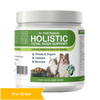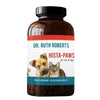How to Fix Leaky Gut in Pets
Gut health is foundational to your pet's overall well-being. Issues like leaky gut can trigger a cascade of health problems, from food sensitivities to chronic inflammation. In this guide, we’ll explore what a leaky gut is, the signs to watch for, and effective natural remedies to restore balance, inspired by insights from experts in holistic pet care.
What Is Leaky Gut?
Leaky gut refers to increased intestinal permeability. The gut lining consists of tightly packed cells connected by tight junctions, regulating what passes into the body. When these tight junctions loosen or are damaged due to inflammation, substances like undigested proteins or toxins can "leak" into the bloodstream. This triggers immune responses and can lead to systemic inflammation, food sensitivities, and other health issues.
Common Symptoms of Leaky Gut in Dogs and Cats
Recognizing the early signs of leaky gut is crucial for timely intervention. Keep an eye out for:
- Recurring digestive issues: frequent diarrhea, vomiting, or bloating.
- Food Sensitivities: intolerance to certain proteins or grains.
- Skin Reactions: persistent itching, redness, or hot spots.
- Low Energy Levels: fatigue or decreased enthusiasm for activities.
These symptoms often indicate underlying gut health issues that, if left untreated, can worsen over time.
Causes of Leaky Gut and Gut Inflammation
Several factors can disrupt gut health in pets:
- Poor diet (e.g., low-quality commercial food).
- Chronic exposure to toxins (e.g., secondhand smoke, cleaning chemicals, artificial fragrances).
- Antibiotic use and microbiome imbalances.
- Environmental stressors or illnesses during puppyhood.
Understanding Key Gut Markers
Dr. Redmond introduced several critical biomarkers that provide insights into gut health:
- Zonulin: A protein that regulates intestinal tight junctions. Elevated zonulin levels indicate increased intestinal permeability.
- Calprotectin: A marker of inflammation in the gut. High levels suggest inflammatory bowel diseases like IBD rather than non-inflammatory conditions like IBS.
- Secretory IgA (sIgA): A first-line defense protein in the gut. Its levels rise with acute immune responses but may drop with chronic inflammation.
The Role of Natural Remedies, Diet and Prebiotics for Leaky Gut
When it comes to addressing leaky gut in pets, natural remedies, a well-balanced diet, and prebiotics play pivotal roles in restoring and maintaining gut health. These approaches not only target the root causes of increased gut permeability but also provide long-term benefits for overall well-being. From incorporating soothing herbs to feeding a diverse, nutrient-rich diet and using prebiotics to nourish good bacteria, these strategies empower pet parents to take a proactive and holistic approach to their furry friend's health. Let’s explore how these three things can support and protect the gut lining while improving immunity and reducing inflammation.
Natural Remedies to Soothe and Repair the Gut Lining
Natural supplements play a crucial role in repairing the gut lining and alleviating inflammation. Ingredients like slippery elm and okra provide soothing relief, while aloe vera helps rebuild the intestinal barrier. Colostrum strengthens the immune system and supports the gut's natural healing process. These remedies work together to restore gut integrity and reduce the symptoms of leaky gut.
Balanced Diet
Dietary adjustments can significantly impact the healing process and overall gut health. Incorporating anti-inflammatory and nutrient-rich foods provides essential support:
- Feed the Rainbow: A variety of colorful fruits and vegetables like blueberries, carrots, and red peppers introduce polyphenols to the diet, which support beneficial gut bacteria and reduce inflammation. These vibrant foods add valuable antioxidants and nutrients to your pet’s diet.
- Avoid Processed Foods: Low-quality commercial pet foods often contain irritants like artificial preservatives, dyes, and grains that can aggravate the gut. Eliminating these from your pet’s diet is essential to reduce inflammation.
- Switch Protein Sources: Rotating proteins or removing potential allergens from the diet can prevent sensitivities and reduce the strain on your pet’s digestive system.
Prebiotics Over Probiotics
While probiotics can help introduce beneficial bacteria to the gut, prebiotics are often more effective in fostering a sustainable and balanced microbiome. Prebiotics, such as those found in chicory root, bananas, and dandelion greens, act as food for existing gut bacteria, promoting their growth and activity. This approach supports long-term gut health and resilience.
Supplements and Detox Support
In addition to dietary changes, targeted supplements can aid in gut repair and detoxification:
- Aloe vera and colostrum help rebuild the gut lining.
- Milk thistle and fulvic acid provide detox support by reducing toxin buildup in the liver and gut.
- Probiotics and prebiotics work in tandem to support a healthy microbiome, but probiotics should be used cautiously, particularly after antibiotic treatments or in immunocompromised pets.
By incorporating these natural remedies, balanced dietary strategies, and prebiotics, pet parents can address the root causes of leaky gut, reduce inflammation, and lay a foundation for long-term health. Regular monitoring and adjustments ensure the best outcomes for pets on their healing journey.
How to Know if It’s Working
Once you’ve implemented dietary changes and natural remedies, it’s important to monitor your pet’s progress. Here’s how:
- Reduced itching, fewer digestive upsets, and increased energy levels are signs of success.
- Re-test gut health markers like zonulin, Calprotectin, and secretory IgA every 3–6 months to ensure inflammation is under control and the gut lining is healing.
- Even if symptoms resolve, testing ensures that underlying issues have been fully addressed, preventing recurrence.
Toxins and Indoor Pollution: Hidden Dangers
Everyday household products can significantly increase your pet’s toxic load, contributing to gut inflammation. Here are some common culprits:
- Air Fresheners and Scented Products
These often contain phthalates and endocrine disruptors that irritate both the respiratory and digestive systems.
- Cleaning Products
Harsh chemicals can linger on floors and surfaces, exposing pets to toxins as they lick their paws.
- Secondhand Smoke
Pets exposed to tobacco smoke are at higher risk for intestinal permeability and chronic diseases.
Tips to Reduce Toxic Exposure
- Use natural, unscented cleaning products.
- Remove shoes before entering the house to avoid tracking pesticides.
- Improve air quality with HEPA filters or DIY air purifiers.
Preventing Relapses and Monitoring Progress
Dr. Roberts underscores the importance of early intervention for symptoms like recurring monthly diarrhea, which can progress into chronic conditions if left unaddressed. Functional testing and preventive care provide a proactive strategy, equipping pet parents with the tools and knowledge to support their furry companions' health effectively.
Testing for markers such as zonulin and Calprotectin offers valuable insights, enabling timely interventions before symptoms worsen. Regular follow-up testing every 3-6 months helps monitor progress and ensures that treatments are on track.
Functional testing isn’t just for pets with existing health issues. Annual gut health checks serve as an excellent preventive measure, particularly as pets age. For those with chronic conditions like IBD, more frequent testing can help identify subtle changes and prevent relapses.
When implementing interventions, it’s essential to track dietary changes and supplements closely. While symptoms like itching or diarrhea may resolve quickly, ongoing testing ensures that any underlying inflammation has been fully addressed, providing long-term health benefits for your pet.
The Holistic Approach to Long-Term Gut Health
Gut health isn’t just about resolving symptoms—it’s about creating a sustainable lifestyle for your pet. By addressing dietary needs, minimizing toxin exposure, and incorporating natural remedies, you can set the foundation for long-term wellness.
Ready to Take Action?
Innovative tests like those offered by Innovative Pet Lab make it easier than ever to assess your pet’s gut health from the comfort of home. Just mail in a stool sample, and you’ll receive a comprehensive analysis with actionable recommendations.
Consider functional testing like the Basic Gut Check to gain insight into your pet’s gut health. These non-invasive tests can help you identify problems early and guide your pet’s care plan.
Proactive care today can prevent bigger issues tomorrow. Take steps now to ensure your pet’s gut—and overall health—thrives.














